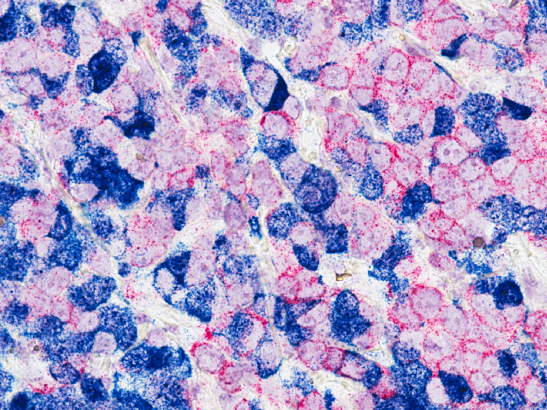
Image: Breast cancer cells. Credit: Min Yu
Treating some women with higher risk breast cancer with a longer course of hormonal therapy before surgery led to more changes in the genetic makeup of their tumours, some of which were associated with better survival outcomes.
Researchers found that treating postmenopausal women with oestrogen receptor positive breast cancer with drugs called aromatase inhibitors – which suppress oestrogen levels – for at least two weeks prior to surgery led to changes in their tumour characteristics.
The study is the first to directly compare the effects of treating patients with short- and long-term courses of aromatase inhibitors on the tumour genetic make-up before having surgery to remove their tumour.
Led by scientists at The Institute of Cancer Research, London, the study found that greater changes were observed in the genetic makeup of a patient’s tumours in those who were treated with aromatase inhibitors for one month or more before surgery compared to two weeks of treatment.
Reduction in tumour growth rate
Researchers found that a longer treatment course led to a reduction in expression of genes responsible for the rate of growth of patient’s tumours, which may provide a rationale for treating women with higher risk oestrogen receptor positive breast cancer with a longer course of aromatase inhibitors before surgery.
The study is published in the journal Clinical Cancer Research, and was largely funded by The Institute of Cancer Research (ICR), which is both a charity and a research institute.
The study compared the genetic fingerprints of two groups of patients with breast cancer before and after treatment with aromatase inhibitors for two weeks, or longer than a month, before surgery.
Breast cancer can be classified into five main intrinsic subtypes, based on the genes that are expressed by a patient’s tumour. Each intrinsic subtype has a different prognosis, and is associated with different response to treatment.
Change to a lower-risk subtype
Researchers at the ICR and The Royal Marsden NHS Foundation Trust, the ICR’s partner hospital, played an important role in the clinical development of aromatase inhibitors - and have led recent studies that have helped to establish the benefits of new breast cancer treatments such as palbociclib, a ‘first in class’ drug that targets the proteins CDK4 and CDK6 in advanced metastatic breast cancer.
Dr Maggie Cheang and colleagues at the ICR are currently seeking commercial partners to continue the development of a breast cancer gene signature for predicting resistance or sensitivity to aromatase and CDK4/6 inhibitors.
In this study, which used tumour samples from the Cancer Research UK-funded POETIC trial, the ICR researchers found that treating patients with aromatase inhibitors before surgery led to a clear shift in the subtype of their cancer in the majority of cases. Changes towards a lower-risk subtype were associated with an improved prognosis, regardless of whether patients were treated for two weeks or more than one month, prior to surgery.
Reassurance for doctors
In the current landscape where there is still a backlog of patients waiting for surgery due to disruption caused by the Covid-19 pandemic, these findings offer reassurance that doctors can treat some patients effectively with hormonal therapy while they wait for their surgery.
Next, researchers plan to validate the findings in a larger scale clinical trial.
First author Dr Milana Bergamino, Clinical Research Fellow in Integrative Genomic Analysis of Clinical Trials at The Institute of Cancer Research, London, said:
“In this study, we found that treatment with aromatase inhibitors before patients having surgery to remove breast tumours, caused women’s cancers to become identifiable as lower risk subtypes and were associated with better outcomes and better response to treatment.
“We also observed that giving a longer course of aromatase inhibitors led to more changes in the genetic makeup of patients’ tumours, leading to a reduction in the growth of their cancer. A longer course of treatment before surgery may be a good option in some patients whose tumours are aggressive.
“Usually, the first line of treatment after patients are diagnosed with oestrogen receptor positive breast cancer is surgery. During the Covid-19 pandemic, when there are still long wait times for surgery, this study may provide reassurance that doctors can give aromatase inhibitors as a first-line treatment, and know that this treatment is helping to reduce the size of patients’ tumours and change their molecular characteristics towards a lower risk tumour whilst they wait for surgery.”
Maximising patient benefits
Study leader Dr Maggie Cheang, Team Leader in Genomic Analysis (Clinical Trials) at The Institute of Cancer Research, London, said:
“The current standard of care for postmenopausal women with oestrogen receptor positive breast cancer includes treatment with aromatase inhibitors over five to ten years following surgery. Our study has shown that adding a comparatively short course of treatment with aromatase inhibitors before surgery could have a significant positive effect on patient’s treatment outcomes.
“This is an important example of a way to maximise the benefits patients get from existing treatments and to identify early those who may be resistant to aromatase inhibitors and need additional treatment.”
